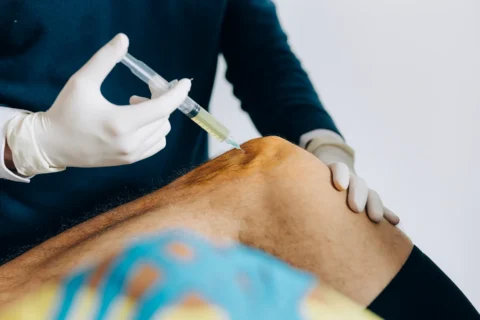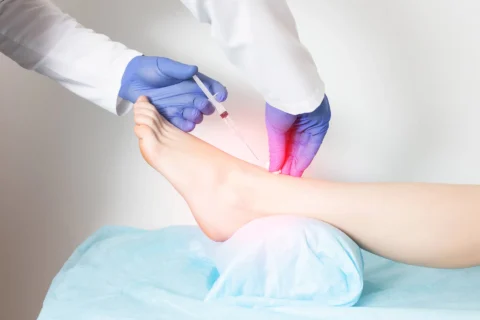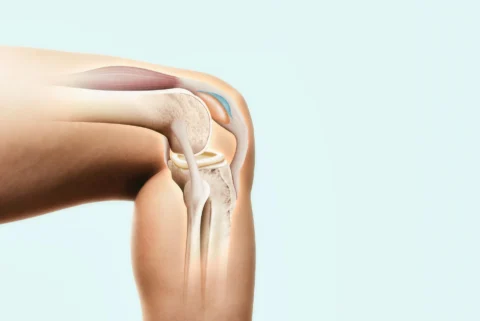Discover the latest in stem cell therapy for knee pain. Learn about the benefits and potential risks.
So, you’ve been dealing with knee pain and considering your options. Stem cell therapy for knees has been gaining attention as a potential game-changer in the field of regenerative medicine.
But what exactly is it, and does it live up to the hype?
Whether you’re seeking relief from arthritis, injury, or chronic pain, understanding the ins and outs of stem cell therapy for knees is crucial before making any decisions about your health and well-being.
How does Stem Cell Knee Therapy Work?
Stem cell knee therapy works by introducing stem cells directly into the damaged area of the knee.
These stem cells, which can be sourced from the patient’s bone marrow or adipose tissue, have the ability to differentiate into cartilage cells.
By doing so, they help regenerate cartilage, which in turn reduces pain and improves mobility. The stem cells are injected into the knee joint area, where they may aid in reducing inflammation and stimulating the growth of new cartilage and tissue.
This is particularly beneficial for conditions like osteoarthritis, which can cause significant damage to the knee.
One of the potential benefits of this regenerative medicine approach is the alleviation of chronic knee pain. By promoting the growth of new cartilage and tissue, stem cell therapy can improve knee function as well.
This, in turn, may potentially delay or even avoid the need for knee replacement surgery. It’s worth noting that stem cell knee therapy is a relatively new and non-invasive treatment option. However, the long-term effects of this therapy require further research.
While the results of stem cell knee therapy are promising, it is important to emphasize that more clinical studies are necessary. These studies are needed to establish the safety and effectiveness of stem cell therapy specifically for knees.
Only through rigorous research can we fully understand the potential of this innovative treatment option.
Does Stem Cell Therapy Work for Knee Osteoarthritis?
According to the promising results seen in reducing inflammation and pain as reported in several studies, stem cell therapy can help with knee osteoarthritis.
Here’s what you need to know:
- Stem cell therapy has shown to reduce inflammation and pain in knee osteoarthritis.
- Clinical trials have demonstrated improvement in arthritis symptoms with stem cell therapy.
- Real-world evidence illustrates long-lasting reduction in knee pain with this treatment.
- Mesenchymal stem cells have been found to stimulate tissue regeneration for osteoarthritis.
Is Stem Cell Therapy Used for Arthritis of the Knees?
Patients with knee arthritis can benefit from the use of stem cell therapy to support self-healing of knee cartilage and reduce inflammation and pain.
Stem cell therapy has been increasingly utilized for osteoarthritis of the knees, with promising results. It’s specifically aimed at promoting the regeneration of knee joints, reducing the need for surgery, and improving overall knee function.
Research indicates that stem cell therapy effectively treats knee osteoarthritis, providing significant relief from pain and enhancing knee functionality.
Stem cells derived from sources such as umbilical or adipose tissue have shown to be particularly effective in alleviating osteoarthritis symptoms in the knee.
This therapy offers a viable alternative for individuals who aren’t suitable candidates for surgery, providing a potential solution for managing knee arthritis.
Who Performs Stem Cell Therapy for Knees?
Orthopedic surgeons and sports medicine physicians commonly perform stem cell therapy for knees. These medical professionals have the expertise to diagnose knee conditions and administer the therapy effectively. When seeking stem cell therapy for knee pain, it’s crucial to consult with a specialist who’s experienced in orthopedic surgery and sports medicine.
Here’s what you need to know about who performs stem cell therapy for knees:
- Orthopedic Surgeons: These doctors specialize in treating musculoskeletal conditions, including knee injuries and degenerative diseases.
- Sports Medicine Physicians: They focus on the treatment and prevention of sports-related injuries, making them well-equipped to address knee pain and recommend stem cell therapy.
- Regenerative Medicine Specialists: Some doctors have specific expertise in regenerative medicine and can offer advanced treatments for knee issues.
- Board-Certified Providers: Ensure the physician performing the procedure is board-certified in their respective field for added reassurance.
Is Knee Stem Cell Therapy Safe?
You should be aware that stem cell therapy for knee osteoarthritis has shown promising results in reducing pain with minimal risks and side effects compared to knee replacement surgery. Research indicates that stem cell transplantation is generally safe and effective for knee osteoarthritis pain.
However, the long-term efficacy of this treatment is still under investigation. It’s important to note that not all stem cell treatments have been approved or proven safe and effective by the FDA. While minor side effects like temporary soreness or swelling at the injection site are possible, the long-term safety of knee stem cell therapy requires further research.
The Arthritis Foundation advises that for certain causes of knee pain, stem cell therapy may not be advisable or effective. Ultimately, consulting with a doctor is crucial to determine if stem cell therapy is suitable for individual knee conditions and pain levels.
Can Stem Cell Therapy Alleviate Bone-on-Bone Knee Pain?
Stem cell therapy has shown promise in alleviating bone-on-bone knee pain, offering potential relief for those experiencing cartilage degeneration and bone grinding.
Studies suggest that stem cell therapy may help by regenerating lost cartilage and reducing inflammation in the joints. However, its effectiveness may be limited in advanced osteoarthritis (OA) cases where there’s significant bone-bone contact due to loss of cartilage. It’s important to note that cartilage regeneration may not occur in such advanced stages of OA.
While stem cell therapy holds potential for alleviating bone-on-bone knee pain, its effectiveness in cases of advanced OA, where bone grinding directly on bone, is still under research. More studies are needed to fully understand its impact on advanced osteoarthritis.
- Stem cell therapy has the potential to regenerate lost cartilage.
- Bone marrow-derived mesenchymal stem cells (MSCs) can reduce inflammation in the joints.
- Stem cell therapy may be limited in advanced osteoarthritis cases.
- More research is still needed.
Can Stem Cell Therapy Effectively Address Knee Cap Issues?
Research suggests that stem cell therapy may offer potential benefits for certain knee cap (patella) problems. Studies have shown that stem cells have the potential to repair damaged cartilage and alleviate conditions such as patellar tendonitis.
Furthermore, ongoing research is exploring the possibility of regrowing cartilage in joints using skeletal stem cells.
It’s important to note that while some clinical trials have shown promising results in reducing knee pain and improving function, more extensive research is still required.
Therefore, if you’re dealing with persistent knee cap issues, discussing the potential of stem cell therapy with your doctor could be worthwhile. However, it’s essential to recognize that there are no guarantees, and the effectiveness of this treatment option is still being studied.
Does Stem Cell Therapy on Knees Effectively Address Arthritis?
The effectiveness of stem cell therapy in addressing knee arthritis is supported by several studies demonstrating its potential to reduce pain and stimulate joint healing. Real-world evidence also suggests stem cell therapy is an effective and long-lasting treatment for knee osteoarthritis, greatly diminishing knee pain.
Orthopedists utilize stem cell therapy because it can relieve inflammation and stimulate healing in arthritic joints. Transplantation of stem cells has also been shown to effectively manage knee osteoarthritis through pain relief. Stem cells from umbilical cord blood may also effectively treat osteoarthritis of the knee.
However, more research is still needed, and providers must have realistic expectations of its effectiveness, as it may not work for all cases of knee pain. While stem cell therapy could potentially treat osteoarthritis, the level of repair possible requires further study.
How Effective Is Stem Cell Therapy in Managing Knee Pain?
Considering the potential for managing knee pain, stem cell therapy has shown promise in various clinical studies. Stem cell injections have notably relieved knee pain due to arthritis at 3, 6, and 12 months post-treatment compared to a placebo.
Additionally, autologous adipose-derived mesenchymal stem cell therapy has improved pain, function, and potentially modified the disease in knee osteoarthritis patients. Some research suggests that stem cell transplantation can effectively treat knee osteoarthritis pain.
However, a recent 2023 study found that cellular injections from fat or bone marrow provided similar improvements in knee pain, questioning the assumed superiority of stem cells.
The long-term effects beyond one year remain unclear. In summary, while stem cell therapy may help reduce knee pain for some patients, its level of effectiveness likely varies among individuals, indicating the need for further research. It’s essential for patients to discuss risks and benefits with their doctor.
If You Undergo Stem Cell Therapy on the Knee Once, Is Subsequent Treatment Necessary?
After experiencing initial relief from stem cell therapy for knee pain, the potential necessity for subsequent treatment warrants consideration due to the ongoing research and varying long-term effectiveness of these therapies.
When considering whether further treatment is necessary after initial stem cell therapy on the knee, it’s essential to bear in mind the following:
- Stem cell therapies offer alternatives to traditional procedures like microfracture for cartilage defects, but their long-term effectiveness is still being studied.
- While stem cell therapy may delay or avoid the need for knee replacement surgery in some cases, patients may ultimately require a knee replacement.
- Mesenchymal stem cells play a role in wound healing, but their effects may be temporary, and additional treatment could be needed depending on the individual and severity of the condition.
- More research is needed to fully understand the long-term effectiveness of stem cell therapies for knee conditions.
Where Can You Obtain Stem Cell Therapy for Knees?
Seeking stem cell therapy for knee conditions? Stem cells can be obtained from bone marrow, adipose tissue (fat), and blood.
Bone marrow provides mesenchymal stem cells that have shown effectiveness in improving knee osteoarthritis symptoms. Adipose tissue also yields mesenchymal stem cells and is typically obtained from the lower abdomen via liposuction.
While less common, stem cells can also be extracted from a patient’s own blood, known as peripheral blood stem cells.
Although research is ongoing for other sources like umbilical cord blood and amniotic fluid, bone marrow and fat tissue are currently the most widely used and studied sources for stem cell therapy for knee conditions.
Major hospitals and orthopedic clinics with regenerative medicine programs typically offer this procedure, extracting stem cells from these sources and injecting them back into the knee joint area.
Conclusion
Stem cell therapy for knees is a promising treatment for knee osteoarthritis and arthritis. It has been shown to effectively manage knee pain and improve function.
While it may not be a one-time fix, it’s a safe and viable option for those seeking relief from knee issues. If you’re considering stem cell therapy for your knees, consult with a qualified healthcare professional to discuss your options.











